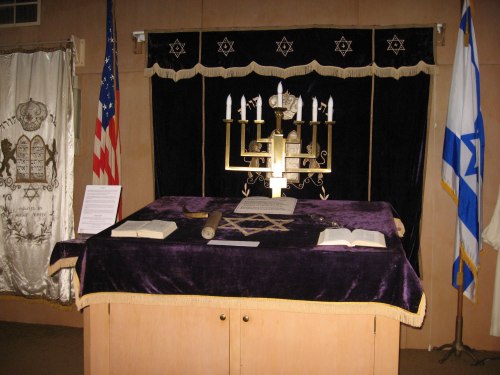
The question of who should speak for the Jews is not a new one, nor is the question of whether or not Israeli political or religious leaders can or should speak on behalf of American (or other Diaspora) Jews. It dates back to a series letters between Jacob Blaustein, then the head of the American Jewish Committee, and David Ben-Gurion, Israel’s first Prime Minister, detailing exactly how America’s Jews can and should support the Jewish State and what that support or allegiance would look like.
It was in those letters that America’s Jews were formally absolved from any allegiance to the Jewish State, and it was promised that America’s Jews would never have to choose between Israel and America. However, this would not be the end of the complicated question of whether or not Israeli political leaders can speak for the world’s Jews. These letters were exchanged in 1950, and, yet, we still conveniently seem to forget that until 1967 and Israel’s victory in the Six-Day War, Reform Judaism, was ambiguously Zionist at best when it passed its Columbus Platform in 1937, and was against the notion that the Jews were a nation for a large part of its history. The American Jewish Committee was officially “non-Zionist” until 1967. Indeed, the exchanges between Blaustein and Ben-Gurion were specifically to assuage the fear that American Jews would have to choose between being loyal to Israel and being loyal to America. To be sure, there were Zionist leaders, such as Judge Louis D. Brandies, and poet Emma Lazarus (of “The New Colossus” fame), who called for the creation of a Jewish homeland in Palestine before the term “Zionist” was even coined. Neither Brandeis nor Lazarus, however, could speak for the majority of America’s Jews. And, yet, today’s leaders of the Jewish community in America like to tout Israel as the consensus issue around which American Jews can organize themselves.
The question of whether or not Bibi Netanyahu speaks for me, or any of America’s other Jews, is not the only question we need to be asking. The larger, and perhaps more pressing, question is: Does anyone speak for American Jews? Should anyone speak for American Jews?
American-Jewish leaders, especially from the turn of the twentieth century onward, have struggled with trying to find some issue around which to organize the Jewish community, some common ground that could unite America’s Jews. This issue really dates back to even before that, with Isaac Meyer Wise, one of the forefathers of American Classical Reform Judaism, and his desire to create the Minhag Amerika, a liturgy and a set of practices that would become the standard for all American Jews, and a sect of Judaism that would be unique to America. The Minhag Amerika, however, was never adopted as widely as Wise had hoped, even though it did gain some popularity. Wise, however, voluntarily retired his own siddur when the Central Conference of American Rabbis, the rabbinic organization of the Reform Movement, published a new prayer book, the Union Prayer Book. Isaac Meyer Wise was no more the all-American rabbi than Shmuley Boteach is today.
This new siddur, too, bore the desire to create a uniform practice within its very title, seeking to create unity through liturgy amongst American Jews. However, Eastern European Jewish immigrants arriving at around the same time would have different plans, with many seeking to keep their own traditional liturgy and practices. The Union Prayer Book, though adopted by many American Jews, did not become the universal liturgy for America’s Jews.
American Jews have never had just one person or organization speak for them, nor have we ever had one consensus, one tradition, around which to organize ourselves, and not for lack of trying. We have failed, time and time again, to organize around any issue that could unite all Jews living in America. And yet, we still continue trying to find that one issue or organization that can unite every American Jew around one common goal, to find one charismatic leader of the Jewish people to speak for all of us and in all of our best .
Yet, those organizations and those leaders have never existed, and I am doubtful they ever will.
This is not to lament: I would like to think that it is not in our best interest to have just one organizing body, or one leader, speaking on our behalf. I would be equally cautious to let an Israeli political leader with whom agreed speak on my behalf as well because I fully recognize that no one leader can represent the best interests of the population of an entire country, let alone those of its Diaspora. Rather, I find some solace in the fact that there cannot be one person who speaks on behalf of all American Jews, or all Diaspora Jews, despite Bibi’s best intentions.
Bibi is not the Prime Minister of the Jewish People, but no Prime Minister ever will be, because no one person can ever represent all of the needs and interests of such a large group of people with such diverse backgrounds and opinions, especially as we American Jews are raised in a culture that differs in such fundamental ways from Israeli culture. And even if Bibi spent many of his formative years living here, he is still fundamentally Israeli, and can thus only speak with that authority and in those interests. (Whether or not he, as a Prime Minister up for reelection in a government that voted to dissolve itself, can even be said to speak for Israelis is a question for a different time.)
Bibi can never speak for me, but that’s not just because he’s Bibi: no one person, no one organization, can ever speak on behalf of all of America’s Jews. Every attempt at creating that one issue, one organization, one charismatic, powerful leader — American or Israeli — has failed in the past. Instead of trying to fight for consensus around one issue, we should, instead, turn our collective focus to fostering the vibrancy and diversity within the Jewish community, not implicitly (or, in some cases, explicitly) shutting it down by trying to find one consensus issue. We are far too many, far too diverse, for that, and we always have been. And I pray that our community continues to grow so that we always will be.
Amram Altzman is a student at List College.

